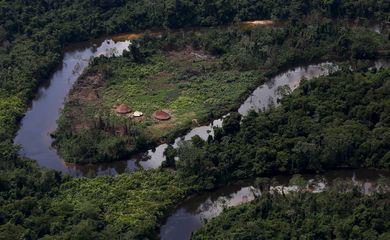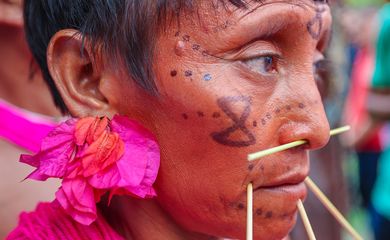Humanitarian crisis haunts Brazil’s Indigenous Struggle Day

The creation the Ministry of the Indigenous Peoples, headed by Sonia Guajajara—Brazil’s first indigenous minister—and the leadership of national indigenous authority Funai in the hands of Joenia Wapichana—also an indigenous woman—unveil a new phase in the history of Brazil’s indigenous policy and give a special significance to February 7—the National Day of the Struggle of the Indigenous Peoples.

The date was introduced back in 2008 as a way to bring visibility to the circumstances facing indigenous people in Brazil, who still suffer from the effects of illegal mining and poor conditions in health care and sanitation.
The minister of the indigenous peoples referred to the illegal mining in the Yanomami indigenous territory as devastating. She spent Sunday night (Feb. 5) at the Surucucu base camp, in the western part of the territory, in Roraima state, near the border with Venezuela. On Monday (6), she returned to state capital Boa Vista and held a press conference to recount what she saw.
“What’s being reported is still far from the reality there. The presence of miners is strong the destruction in the territory is devastating. It’s a lot of mining—infinite mining, the whole territory is taken over by miners, by destruction and water contamination. The Yanomami can’t drink the water. They have no clean water to drink,” she stated.
The minister flew over the Homoxi and Xitei regions—two of the areas where miners are most present—and said she was unable to land in the more isolated communities as it was not safe. The miners are concentrated in the larger villages in a bid to protect themselves, she noted.
“We tried to land in two places and we couldn’t, due to safety issues. A large number of miners in the area are already aware they have been ordered to leave. They’re fleeing from the smaller mines and concentrating at the larger ones. They’re all staying together,” she said.
Stranded
According to local leaders, such as Junior Hekurari Yanomami, head of the District Council for Yanomami and Ye’Kuana Indigenous Health, approximately 180 isolated communities have so far failed to receive medical or social assistance. The health status of these people is not yet known. They are estimated to number some 15 thousand, in locations stretching as far away as the neighboring state of Amazonas, where a section of the Yanomami indigenous territory is located.
“A total of 180 communities have been given priority. These stand uncared for, and they’re also in the state of Amazonas,” the minister noted.
She also spoke about the death of an indigenous baby—who could not be removed to Boa Vista because of poor weather conditions—and the murder of three indigenous people by miners. At least one body has been handed over to the family, and two are still to be rescued. One of them was killed in the Homoxi region and the other two in Parima. The Federal Police are investigating these crimes in the territory.
Game changers
Minister Guajajara said the Surucucu airfield should be ready within three weeks, which is expected to enable larger aircraft to land. The measure will facilitate the creation of a field hospital to treat more complex cases without the need to remove patients to Boa Vista. According to Ernani Santos, local coordinator at the Center for Emergency Operations, the demand for care is likely to increase in the coming weeks and the construction of a new hospital will ease the burden on the capital’s health care network.
Food
The federal government is also revamping the distribution of staple food to the Yanomami. The contents of shipments are not part of their traditional diet and are also being sought by miners, who, unable to fly out of the territory, are running out of supplies as well. According to Lucia Alberta Andrade, director of Sustainable Development at Funai, the Yanomami want to resume production as a matter of urgency.
“We’ll offer a hand so that villages where things are not so severe may start growing their crops. They no longer want to consume the kits we’re sending them. They want to produce, to plant their manioc, their bananas. It’s among their requests,” she pointed out.
The Ministry of Social Development and the Fight Against Hunger is also expected to work on the drilling of artesian wells and the construction of cisterns in the Yanomami indigenous territory to ensure the supply of drinking water, as the contamination of rivers by mercury, used in mining, has made water consumption inappropriate.





